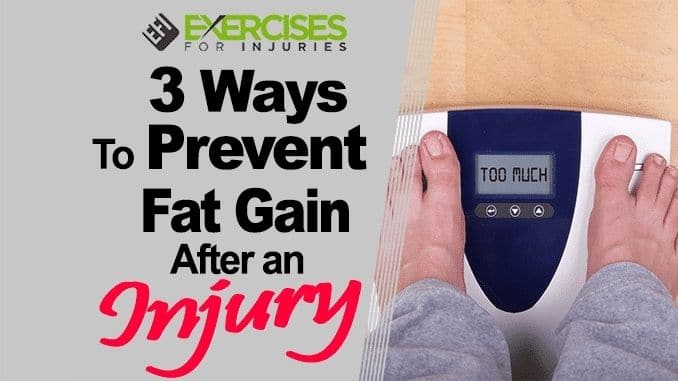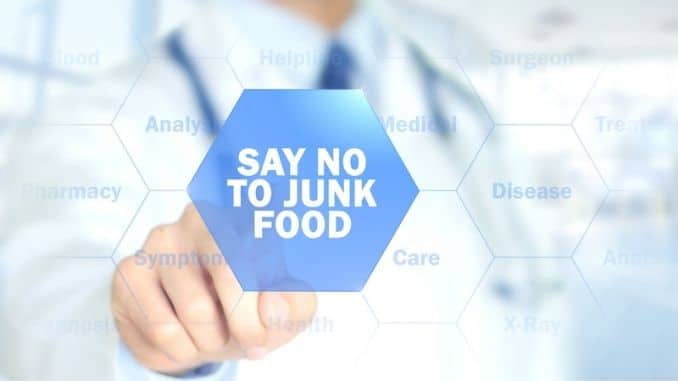
There are ways to reduce the chance of gaining weight, so here are five strategies to help you prevent fat gain after an injury.
It has happened to all of us.
We are active, and then we get injured.
Because we are injured, we can’t exercise or do the physical activities we enjoy.
This consequently leads to weight gain and prolongs our injury recovery time.
Today, I have an article from Shane McDavid on what you can do about this.
I met Shane in January in Miami at a Mastermind Meeting. It was fascinating talking to him over lunch. He specializes in foods to help suppress your appetite.
Below, Shane shares ways you can prevent fat gain after an injury.
Enjoy!
Rick Kaselj, MS
Hey everyone, it’s Shane McDavid from the Appetite Control Blueprint.
I bet you may have been in this situation before.
You’re lying on the couch with your feet up watching your favorite television show.

The good news is you’re finally catching up on some much-needed rest.
The bad news is that you’re on the couch and not training because of a tweaked hamstring or maybe an injured shoulder, a strained lower back, or a pulled calf muscle. I think you get the point.
Not only are you not working out as much, but I bet your diet is not as strict as it once was.
Gaining Body Fat After An Injury
This is an important time frame in your training cycle that you can’t overlook. Gaining body fat right after an injury will only make your recovery time longer. You also have to get enough micronutrients to help facilitate the recovery process. The downside is that recovering from your injury will often lower your metabolic rate.
This means you’ll need to avoid eating too many calories while providing enough nutrition to help improve your recovery. Unfortunately, that bag of potato chips and cookies on the counter becomes even more tempting to eat.
The only way to not gain body fat when recovering from an injury is to control your appetite. “Boosting” your metabolism doesn’t work in this case. Thankfully, our body has a natural way of controlling our appetite to ensure adequate vitamins and minerals while not getting too many calories.
Think about the times you’ve tried to “boost” your metabolism and lost a little weight, but saw all of the weight return.
The food industry has made food that makes you feel hungry, even when you’re not. Ever find yourself craving something “salty” or “sweet” after you just finished a meal?
3 Ways to Prevent Fat Gain After an Injury
1. Lower Carbohydrates
When you’re training hard, having a decent amount of carbohydrates improves recovery, allows you to train harder, and refills glycogen levels, giving you better leverage for your workouts.
Reducing carbs will improve insulin sensitivity and keep body fat in check when recovering from an injury. The more your injury limits your ability to be active, the fewer carbs you’ll need. Your main carb sources should come from non-starchy vegetables. If you’re eating carbs in all meals, remove carbs from just one meal and then reassess.
2. Awaken Your Inner Carnivore
You HAVE to eat enough protein. Aim for 1 gram of protein per pound of bodyweight. We do this for a few reasons:
- Improves Recovery
- Suppresses Your Appetite
- Helps you retain more muscle
- It gives you another reason to eat more steak – probably the best reason, in my opinion!
3. Get Rid of the Junk Food!
I know this tip isn’t what you want to hear. Everyone tells me they’ll buy the processed food and leave it for their family, but we all know what really happens.
But what if you are married and have children?
Here’s the key: I bet your kids or spouse have favorite snacks you don’t care about. You obviously can’t deprive them of their favorite snacks. THOSE are the treats that you can keep around the house.
Remember, take this time to focus on limiting body fat gain. We’ve had a lot of our clients get leaner during this phase. Their recovery time was shorter, and they returned to their normal workouts MUCH SOONER.
About Shane:
Shane McDavid is a former obesity researcher with expertise in appetite control. After realizing how most diet programs were failing miserably, he set out to learn why the typical fat loss “tip” of boosting your metabolism was not working. He finally discovered the key to overcoming food cravings and how you can overcome a slow metabolism by implementing a step-by-step strategic plan.
If you’re looking to get leaner and stop falling for all these “metabolism boosting” gimmicks, check out the 14-Day Metabolism Booster for the step-by-step process to stop struggling with losing body fat.
Shane McDavid


